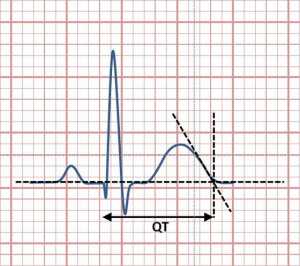
14 May Grapefruit Juice Can Cause an EKG Change, Prolonged Q-T Interval, Aggravated by Some Medications
MedicalResearch.com Interview with:
Sami Viskin MD
Tel-Aviv Medical Cente
Sackler School of Medicine
Tel-Aviv University, Israel.
MedicalResearch.com: What is the background for this study? What are the main findings?
Response: There are >200 medications with reported QT-prolonging risk. The majority of these medications do not even have cardiac indications, yet cause unintended QT-prolongation because they block IKr potassium channels in myocardial cells. With so many drugs, of such varied composition, blocking the IKr channel, it is reasonable to assume that food compounds also have IKr-channel-blocker properties, raising the possibility that proarrhythmic food exists.
We tested the effects of grapefruit on the QT interval with the rigorous methodology used by the pharmaceutical industry to test new medications before they are released to the market.
MedicalResearch.com: What is the background for this study? What are the main findings?
Response: We found that grapefruit juice prolongs the QT interval of healthy volunteers. The absolute QT prolongation is small. However, it is similar to the QT prolongation caused by moxifloxacin, an antibiotic with known QT-prolonging properties that very rarely cause QT-related arrhythmias. The QT-prolonging effects of grapefruit juice were greater in females and particularly marked in in patients with congenital long QT syndrome.
MedicalResearch.com: What should readers take away from your report?
Response: Patients taking QT-prolonging medications should definitively avoid drinking grapefruit.
Our study shows that, in large doses, grapefruit juice prolongs the QT interval to a similar degree as moxifloxacin, an antibiotic with confirmed but low risk of TdP. Our study does not imply that daily consumption of grapefruit juice involves any measurable risk for the general population. A possible exception could be the consumption of “health drinks” containing highly concentrated grapefruit products.
Patients with long QT syndrome should be informed that drinking grapefruit in large quantities may impose some risk. Also, when patients with long QT syndrome present with arrhythmias, it is common practice to inquire about recently consumed drugs. We suggest that the medical history intake in such cases should also include questions about recently consumed food products.
MedicalResearch.com: What recommendations do you have for future research as a result of this work?
Response: The effects of daily consumption of grapefruit on the QT interval should be tested.
Citation:
Ehud Chorin, Aviram Hochstadt, Yoav Granot, Shafik Khoury, Arie Lorin Schwartz, Gilad Margolis, Rami Barashi, Dana Viskin, Eihab Ghantous, Michael Schnapper, Tal Mekori, Dana Fourey, Milton Ernesto Guevara-Valdivia, Manlio F. Marquez, David Zeltzer, Raphael Rosso, Sami Viskin. Grapefruit Juice prolongs the QT Interval of Healthy Volunteers and Patients with Long QT syndrome. Heart Rhythm, 2019; DOI: 10.1016/j.hrthm.2019.04.039
[wysija_form id=”3″]
[last-modified]
The information on MedicalResearch.com is provided for educational purposes only, and is in no way intended to diagnose, cure, or treat any medical or other condition. Always seek the advice of your physician or other qualified health and ask your doctor any questions you may have regarding a medical condition. In addition to all other limitations and disclaimers in this agreement, service provider and its third party providers disclaim any liability or loss in connection with the content provided on this website.
Last Updated on May 14, 2019 by Marie Benz MD FAAD

